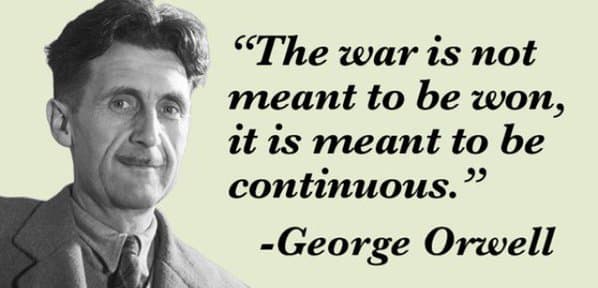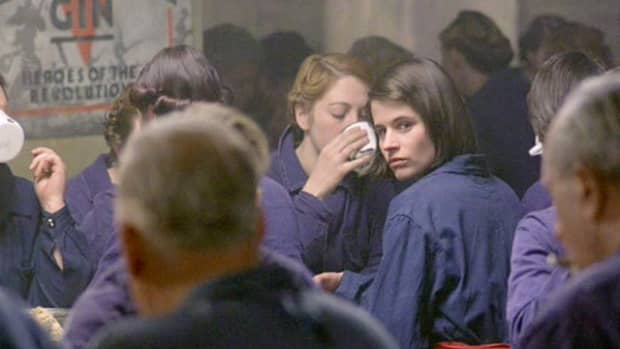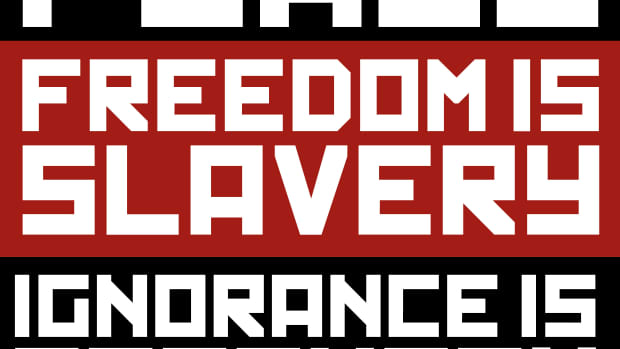How Has George Orwell's Novel "1984" Come True Today?
George Orwell's 1984 and Today
In the novel 1984, written in 1948, George Orwell presents a dystopian society that was intended to be a warning about the future of our world. Although, at the time, the reality that was set for the novel was almost unthinkable, in many ways, our society has come to look quite similar to the fictional one Orwell created.
One way our real world and Orwell’s fictional world resemble each other is in the prevalence of surveillance, which has been detailed in the book The Culture of Surveillance: Watching as a Way of Life by David Lyon. This topic has also been discussed in numerous papers and textbooks, and a number of articles have been written to examine these similarities.
In addition to the unprecedented use of surveillance, there are several other concerns about the future that Orwell expressed in the novel 1984 that have come to pass. These include the state of perpetual war, the prevalence of language shortcuts similar to what is termed “Newspeak” in the novel, and the reliance on fake news or “alternative facts” as a means of controlling public opinion. The presence of these factors in our society is altering the way we think about the world and what we are willing to accept in how we are treated by our leaders.
Perpetual War
In 1984, Oceania is always at war. The enemy is seen to change across the timeline of the book, but the war never ends. Sometimes the enemy may shift in a moment without any kind of admission that this has occurred. For example, during a "Hate Week" rally, the Oceania’s allies suddenly change and the person giving the speech switches literally mid-sentence, and goes from reviling one enemy nation to reviling another. The place where the battles are occurring is never stated, it’s just somewhere far away.
Regardless of the vagueness in terms of the identity of the enemy and the location of the fighting, the people know that Oceania is in a seemingly unending war, with an associated wartime economy. They take these things for granted and don’t question even obvious inconsistencies, such as a country being an ally one minute and an enemy the next, with no explanation of how this came about.
This situation is paralleled in our reality today, as we continue to fight the War on Terror, a general war with the goal of stamping out terrorism and potential terrorism everywhere it might exist. We have seen alleged terrorist attacks since 9/11 in the U.S., Europe, the Middle East and South Asia, in addition to other locations. Since it is difficult to believe that the world will ever be completely free of terrorist plots, this war is one that could go on indefinitely.
We also have had a shifting line in terms of who our friends and our enemies have been in the U.S. For example, prior to 2006, Libya was considered an enemy of the U.S. and was on the U.S. list of terrorist-supporting nations. In 2006, full diplomatic ties with Tripoli were re-established, with a U.S. embassy established there, as a reward for dismantling their weaponization program. It was further decided to remove Libya from the list of nations that sponsor terrorism after it seemed the country no longer supported armed groups and countries that were involved in developing weapons of mass destruction. The U.S. began to refer to Libya as an ally with similar goals.
In May 2018, U.S. President Donald Trump issued a travel ban for Libya which was upheld by the U.S. Supreme Court in June of the same year. The U.S. also issued new rounds of trade and economic sanctions against the country. Libya began to be referred to as a terrorist nation even if it fell short of being added to the list of countries considered guilty of State Supported Terrorism.
In terms of a wartime economy, this is not as evident as when there has been rationing or other limits such as for gasoline or food staples. Yet, the taxes we pay are still clearly supporting the war on terrorism and our GNP is greatly affected by these efforts both of which undoubtedly will continue for the foreseeable future.
While the war on terror is obviously an important effort, there have been questions raised as to how necessary it truly is. Questions abound about whether the war is serving its purpose of making the U.S. look strong alongside the rest of the world. Some have questioned whether the continued involvement around the world in this "war" is more of an attempt to keep the American people focused on a common "enemy," even if the enemy isn't actually a single nation.
This is exactly what the Party is using the fake war for in the book 1984. If this is the case, even in part, then it is plausible the war effort against terror may never be brought to an end. It's likely there will always be terrorists, and that our continued involvement will be justified to unite us as a nation.
Newspeak
In the novel 1984, Newspeak is a language which includes words that are essentially cut off and shortened, then strung together to create new words. The intention of Newspeak is to limit the usefulness of language to get rid of words that allow people to think and speak about revolution thereby preventing them from revolting against the government.
This idea that language allows you to form ideas you otherwise couldn’t form was first proposed by Benjamin Lee Worf, and it became a pervasive belief. With research, however, it came to be understood that you can obviously talk about things you may not have a word for. While language may not affect what thoughts we have, it does seem to affect which thoughts we remember. So based on that, the assumption in the book that limiting all thoughts about revolution by getting rid of relevant words might be possible, but it would be through the process of memory not the thoughts themselves.
The use of non-standard language, abbreviations and new words have not been consistently shown to be related to literacy or language comprehension. However, it is strongly related to the amount of time a child spends reading which has been linked to literacy and comprehension. Texting and the creation of new language components and ways of communicating have also found their way into all forms of written language both formal and informal which has begun affecting public discourse. Additionally, the different rates of cell phone use and accessibility based on generation and socioeconomic status could lead to different segments of society having difficulty communicating with each other.
Recommended
The difference between the novel and reality today is that the language alterations and truncations have not resulted from the deliberate intent of the government to control thought specifically. However, the shortcuts that have found their way into language in recent years have indirectly affected literacy and language comprehension and have directly affected communication and public discourse. They have also led to a generational and socio-economic standard divide in terms of communication which could result in differences in understanding.
Fake News
One of the main components of 1984 are the Telescreens that emit continuous government propaganda. Additionally, Winston is employed to edit news reports to reflect the propaganda the government wants the people to believe. He even makes up imaginary people as witnesses to validate this new reality. The government in 1984 is also engaged in trying to get the people to only believe what the Party says, not what they know what is really occurring based on the evidence.
“The party told you to reject the evidence of your eyes and ears. It was their final, most essential command,” (pg. 29-30).
These sentiments have been expressed by U.S. President Donald Trump in a speech to his supporters. The U.S. president instructed them to not listen to what they read or saw in the news.
“Just stick with us, don’t believe the crap you see from these people, the fake news,” Mr. Trump told the crowd. “Just remember, what you’re seeing and what you’re reading is not what’s happening.”
Even though the audience was filled with his supporters they did not appreciate the message and erupted in boos, unwilling to be manipulated to believe what they are told not what they know through proof. It is ironic that the President is accusing others of spreading propaganda as he is essentially saying to just let him tell them what to think not to decide for themselves. This is the basis of being able to spread falsehoods and manipulate others into believing what you want them to believe. President Trump has been accused of spreading false news before as well. His support of his cabinet appointments, the statement that his inauguration had the largest turnout in history and claims of voter fraud, all of which have been shown to be inaccurate, have been given as just a few of many examples.
In today’s digital age, fake news and alternative facts have become the new norm. In fact, it is so common on so Facebook that Mark Zuckerberg is working with experts to create strategies to fight it. Twitter bots are actively spreading fake news, even while other bots are being employed to prevent this. There is more information available than ever and yet we constantly have to question its veracity and validity. After hours of careful research, we still may end up with figures and statistics that are not accurate because they have been reported out of context. In other cases, numbers and facts have been completely made up.
In 1984, Winston is okay with the fact that he is altering reality by changing the information people are given about their world. This is because he believes in an objective truth that can stand on its own and doesn’t need any additional information to validate it. We are much the same today as we believe that somehow the truth will out. We aren’t overly concerned with the state of the Internet which allows anyone to post anything online for all to see whether it is truthful or not. We feel that either we’ll be able to tell what is true and what is untrue, or that eventually the truth will have to be disclosed.
Yet we can’t always tell real news from fake news, especially when both sides are accusing each other of being the ones who are purposely spread false “facts” in an effort to misguide the public. In the absence of readily verifiable evidence, when the leaders of the society are providing the information it is almost impossible to know what is real and what is made up.
The Lessons of 1984
In conclusion, while George Orwell’s novel, 1984, was clearly a work of fiction written in the late 1940’s, the reality he predicted has been seen to come true in a number of areas. Surveillance and loss of privacy is a common occurrence in modern times. The war on terrorism seems to be unending with changing enemies and allies, shifting locations and no identifiable battlefields. Language shortcuts used to more quickly communicate digitally with a few letters often expressing entire thoughts are influencing literacy and cognition and causing divides between different segments of society. Fake news and alternative facts are accepted as objectionable yet unavoidable, even when uttered by government leaders and even when the falsehoods are obvious.
Government leaders have always attempted to manipulate the truth in their favor, of course. Yet it seems in modern times that reality is allowed to be altered based on leader’s whims without effort to even conceal this any longer. When what is true one day is said to be false the next and vice versa, this could lead to a state of affairs in which ignorance is accepted as the status quo.
As more and more information is made available to us in real time the chance that anyone will be able to verify the sources and evidence will continue to decrease. Without an insistence on accountability and a culture where truth is valued and logic used for debate instead of propaganda we could lose the ability to tell reality from falsehood.
In 1984, Winston asks, “How do we know that two and two make four? Or that the force of gravity works? Or that the past is unchangeable? If both the past and the external world exist only in the mind, and if the mind itself is controllable – what then?”
The answer to this question may be a world where we accept what we are told without question as absolute truth, even when it defies rational thought. This can only result in a reality where, like in the novel 1984, we don’t try to counter even such obvious contradictions as “Black is White”, “2+2=5”, or “War is Peace, Freedom is Slavery, Ignorance is Strength.”
It is up to us to prevent others from influencing our thoughts and beliefs with propaganda and to insist that our leaders avoid using fake news and alternative facts as an easy way to win favor over their opposition. Leaders must have followers to lead. If we blindly follow individuals without demanding that they are worthy of our support, then we will be to blame for any further loss of truthfulness, privacy, and basic rights that could result. We are ultimately responsible for our leaders words and actions, as we are the ones who must evaluate what they say and who give them permission to act on our behalf.
Related Articles
If you enjoyed reading this article, you might also enjoy these, as well:
- The Meaning of War is Peace, Freedom is Slavery and Ignorance is Strength in Orwell’s 1984
- Why Did Orwell Choose Freedom is Slavery Instead of Slavery is Freedom as the Second Slogan in 1984?
- A Different View of Women in Orwell’s 1984
© 2018 Natalie Frank
Comments
Ian Stuart Robertson on August 21, 2020:
Perhaps he knew too much !
Michael on July 30, 2019:
I wish we could one day not mention the name Trump. Just for one day. How about we, for kicks and giggles just accept the blame ourselves and say, " I did something wrong" And then shake a neighbor's hand, give someone a shoulder to cry on, and your heart and pledge to be a real human being to the world.
Natalie Frank (author) from Chicago, IL on August 09, 2018:
I don't think it always has to come from the Government at all. Doris. I think that through our own apathy and passivity we fail to take such things seriously, even finding them a bit humorous at times. Yet with the new digital world if we don't become better keepers of our history we stand to lose the truth of much of what has happened in the course of our nation and why.
Natalie Frank (author) from Chicago, IL on August 09, 2018:
Orwell was certainly a controversial figure, though I don't agree with some of the criticism of him. In particular the reviewers comments that he was clearly a misogynist. But when you write controversial fiction I guess you end up with your detractors. Thanks for stopping by, Vladimir.
Natalie Frank (author) from Chicago, IL on August 09, 2018:
Yes, Liz, I'm not even sure if Orwell believed that things would surpass his visualization of a future dystopia. Thanks for the comment and for stopping by.
Natalie Frank (author) from Chicago, IL on August 09, 2018:
Thanks for weighing in, Miebakagh. I am sure things are very different in Nigeria and from what you say, it seems there are a lot of abuses that are being carried out. I hope things change for the better there in the coming year.
Natalie Frank (author) from Chicago, IL on August 09, 2018:
It seems like the current political atmosphere is making the time right to read the book again and to consider it's message. Thanks for the comment and for stopping by Dora.
Natalie Frank (author) from Chicago, IL on August 09, 2018:
I'm glad you found the article interesting, Liz. Thanks for stopping by.
Natalie Frank (author) from Chicago, IL on August 09, 2018:
Thanks for such a detailed and well thought out response, Vladimir. I'll have to read through it again to make sure I have all your points down. I agree with much of what you say. The end point in particular is an important one - I think what we call terrorism is largely based on self interests, who is doing the bombing and the response of the international community. Thanks again.
Natalie Frank (author) from Chicago, IL on August 09, 2018:
It's amazing how timely the novel is today, especially given the last election and how things have been going since. Thanks for stopping by, Bill.
Doris James MizBejabbers from Beautiful South on August 08, 2018:
I first read 1984 in the late 1960s, and occasional thoughts about it have cropped up in my mind ever since then. I do see certain parallels to the dystopian novel. But I also see something else, and that is certain civilian groups trying (and succeeding, unfortunately) to rewrite history. "We don't like that statue (or that flag), so you must tear it down (or burn it) or you aren't politically correct." Isn't this just another version of 1984? Does that kind of thinking always have to come from the government?
ValKaras on August 07, 2018:
Very interesting, and extremely well written article. Too bad that George Orwell's private life was so much of a drama, not reflecting much of his exceptional mind's capacity.
Liz Westwood from UK on August 07, 2018:
This is a very thoughtful and challenging article. Eery how modern life has echoed this novel in some respects.
Natalie Frank (author) from Chicago, IL on August 07, 2018:
Great points, Dan. I dread the day when there are no more paper copies of anything. That is the day that everything starts to be rewritten, some of it purposely for ideology, some for political gain, some for financial gain, some to see if people can get away with it. . . etc. etc. etc. We are already too close for comfort, with paperless bills, paperless report cards, paperless records and documents of all kinds. Thanks for the comments and for reading.
Natalie Frank (author) from Chicago, IL on August 07, 2018:
I think it's been happening for a while now, Flourish. I think it's what let the 2000 Presidential elections happen the way that they did. Along with the most recent election. Thanks for stopping by.
Miebakagh Fiberesima from Port Harcourt, Rivers State, NIGERIA. on August 07, 2018:
Hello Natalie, I had read 3 classic books on George Orwell. One of those is 1984. I read this book from cover to finish. Then in your(?) news magazines like NewsWeek and NewsWatch the essence of the 1984 began to bubble. I read and watch and came to the conclusion that Orwell must be a prophet.
Don't get me wrong. Look at the book "Animal Farm." How prophetic Orwell is. It did not apply to European contries alone. Now my country Nigeria is the real Animal Farm of the 21 century, where the politician get rich and richer ( some are now milionaires and billionaire!)
Where is the result of the London and Paris loan fund for the payment of pensions and salaries? Some governors embazzle the money. Some used it the build private hotels. This politicians were even being protected by the head of state and commander-in-chief.
But let's see what will happen in 2019. Thank you. I loved reading your articles for its rich informations.
Dora Weithers from The Caribbean on August 06, 2018:
Thanks for reminding me of this novel. For years, I've been attempting to reread it. Your article tells me it's time. Things have happened that brings to mind similar scenarios in the book.
Liz Westwood from UK on August 06, 2018:
This is a very interesting comparison.
ValKaras on August 06, 2018:
Natalie---Absolutely great article, and I wish it would be read by those brainwashed masses who are actually making those in power so effective.
I don't think, however, that the change will ever come because people would start thinking differently, but because they will reach their point of emotional exhaustion, and only then a spontaneous shift may happen in a better direction.
I like comparing nations to individuals and their mental dynamics. You may have a hard time intellectually convincing a person that their positions are counterproductive. But if you let them get tired of constantly bumping into reality, they may come to their senses.
Consciousness evolution is terribly slow, and it's not likely to ever become something like a "positive pandemic", but will continue with cases of awakened individuals here and there---minimally affecting those who insist on staying asleep.
Those can be seen everywhere these days with their dark passion to pick a fight---whether with "culprits" in their own society or abroad, instead of seeking a common ground leading to national harmony and prosperity.
It really makes no difference who is in power if people are acting out their "automatic pilot" programmed to resist, to fight, to see wrongness. We are bound to see this same national mood once that Trump is replaced.
You are a psychologist, so you qualify more that I do to figure out if that mentality is a symptom of an aversion towards parental figure in a bunch of kids spoiled by too much freedom, or anything else.
Like I said in one of my recent articles, media are not to blame, they are merely a business catering to the demand of the market and providing something to everyone, like a variety store.
Their obligation to be "moral" and tell the truth is laughable, since you can see equal "morality" allowed in businesses of pornography, selling alcohol, cigarettes, sugar, polluting oceans with toxic waste, and in medical/Big Pharma business, to name only these few.
As for surveillance of civilians, personally I don't really care, they can tap my phone if they want to get bored to death by my phone conversations.
And being constantly at war ---whether military or economic ---is the perfect formula for losing valuable friends. Sometimes it's good to trace terrorism back to its beginnings to see who actually started that game. The western civilization has officially lost colonies, but their greed for domination has never stopped. It's hard to tell apart "terrorism" done by bombing a sovereign country "because it's in the national interests"---and the one done by a bunch of masked and wild individuals.
However, again, I really enjoyed reading your article, Natalie.
Bill Holland from Olympia, WA on August 06, 2018:
I'm really going to have to read it again. My memory of it is such that I know he came pretty darned close to describing life thirty years in the future, as we know it today. Off to the library I go!
Dan Reed on August 06, 2018:
This is definitely a "make you think" article but I think many of us think on this all the time but cast it out quickly as not to get sucked into the rabbit hole. The truth is a very scary thing and if we truly lived in it, we would already be in a revolution. We ignore things all the time to stay within the comforts of our daily lives. We welcome surveillance...pay for it for that matter, then complain about how we're being watched. (phones, smart home devices, computers, all watch and listen) And on and on and on...
I also think lines can be drawn from fiction to reality in more than just 1984. There are many books, prophecies, movies...that when broken down can be seen as predictors and then people begin to see it as truth and then the line is destroyed and fiction/reality become one.
In the end, it boils down to the individual to determine what they will believe and how they will act upon those beliefs whether true or not. Truth barely matters anymore, just what is more believable than a another. Once the stories have all been electronically documented, they can also be edited. Books are dying. Printed news is dying. Once all the information can be mended as needed and the truth becomes a needle in a needle stack, it will all come down to the person and what makes them feel validated. People will eventually have to choose a side or become victims of both.
There are 2 awesome X-Files episodes from the newest season (2018) that cover technology and information and talk about making you think! "The truth is out there" Haha.
Good read Natalie!
Elaina Baker from USA on August 05, 2018:
Very thoughtful and I loved the lead photo’s quote.
When I first read 1984 decades ago I thought the whole concept was far fetched, unfathomable. I can’t believe the world we live in now and how we got here. I often try to think what the turning point was. I’m sure it was before the 2000 Presidential election (which was one of many warning bells). I haven’t come up with an answer though.











